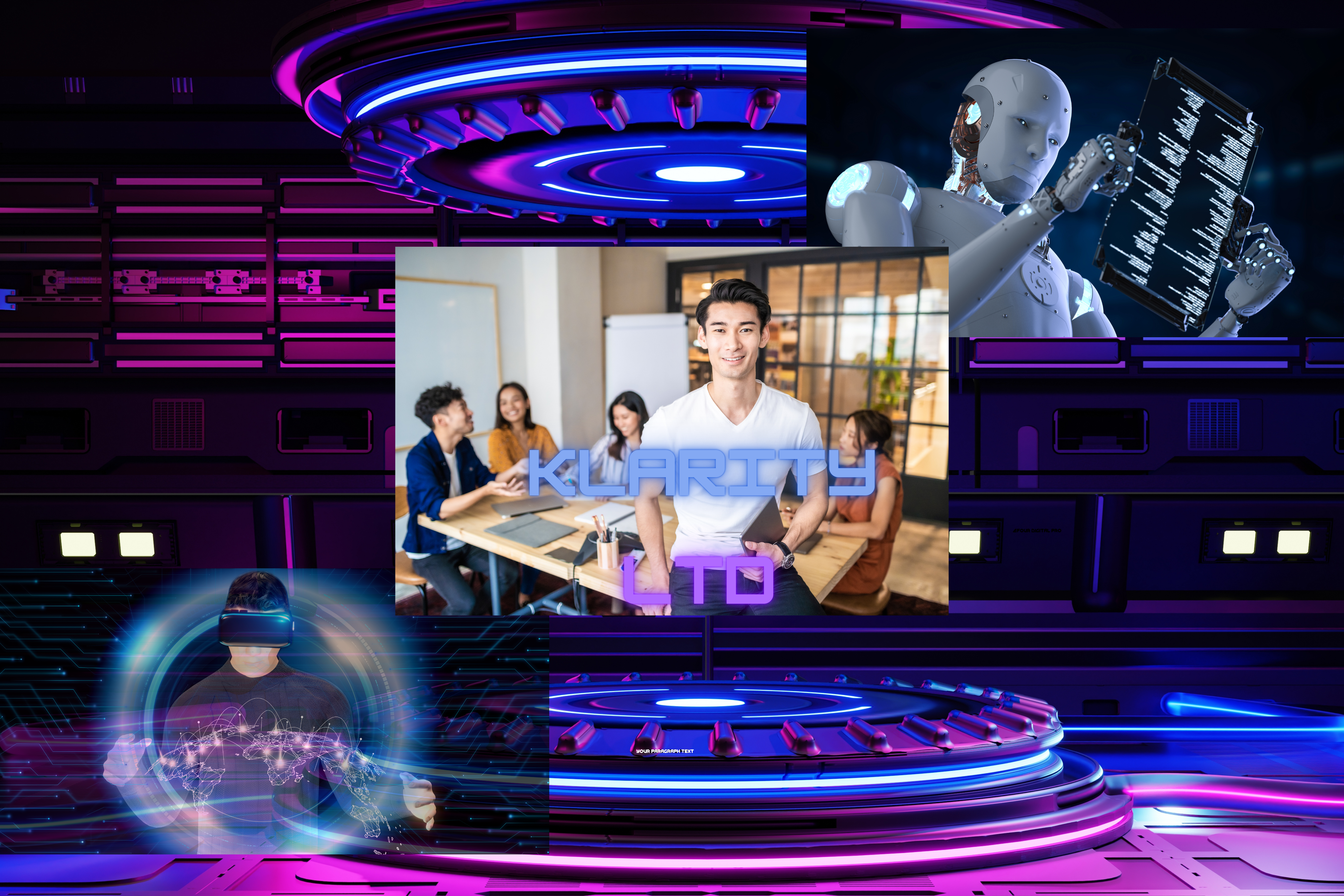Embracing the Future: AI and the Metaverse in E-commerce
Like it? Share it....
Embracing the Future: AI and the Metaverse in E-commerce
Introduction: Transforming E-commerce with Emerging Technologies
In today’s rapidly evolving digital landscape, businesses are increasingly turning to emerging technologies to stay competitive and deliver enhanced customer experiences. Among these technologies, Artificial Intelligence (AI) and the Metaverse are at the forefront, promising to revolutionize the e-commerce industry. While these innovations offer exciting opportunities, they also come with challenges that businesses need to navigate carefully. At Klarity International Ltd., we specialize in guiding businesses through this transformation, helping them harness the power of AI to streamline operations, enhance decision-making, and drive innovation.
1. The Rise of AI: Transformative Innovation or Overhyped Trend?
Artificial Intelligence has transcended the realm of buzzwords, becoming a key driver of change across various industries. No longer just a concept, AI is reshaping business processes and influencing economic structures on a global scale.
According to a report by PwC, AI could contribute up to $15.7 trillion to the global economy by 2030. This projection underscores AI’s capacity to enhance productivity, introduce innovative products and services, and drive consumer demand across sectors like healthcare, finance, and retail. However, as AI continues to advance, its impact on the workforce is becoming increasingly significant. While AI automates repetitive tasks, it also emphasizes the need for human skills such as creativity, critical thinking, and subject matter expertise. This shift is driving a move towards a skills-based approach, where roles are defined by the skills they require rather than traditional job descriptions. Yet, many workers feel that employers remain overly focused on qualifications and job history, often overlooking the human skills crucial to unlocking AI’s full potential.
Impact of AI on the Workforce and Employment
AI is transforming industries by automating routine tasks, enhancing decision-making, and creating personalized experiences. While these advancements streamline operations and drive innovation, they also raise significant concerns about the workforce. As
AI takes over more repetitive and entry-level jobs, there is a risk that junior employees may miss out on crucial opportunities to acquire practical skills and experience. This could exacerbate the existing skills gap unless organizations
adopt new strategies for learning and development. On the positive side, AI has the potential to enhance workplace diversity by democratizing access to advanced tech skills. This could open doors in fields traditionally limited by specific backgrounds and qualifications. However, the ethical implications of AI in hiring and career advancement must be carefully considered to prevent reinforcing existing biases.
The growing influence of AI also highlights the increasing value of uniquely human skills such as creativity, critical thinking, and domain expertise. This shift is prompting a move towards a skills-based approach to employment, where roles are defined by the abilities they require rather than conventional job descriptions. Nonetheless, many workers feel that employers continue to prioritize formal qualifications and job histories over these essential human skills, which are vital for leveraging AI’s full potential.
AI is no longer a futuristic concept; it’s a critical component of modern business strategies. By automating routine tasks, providing data-driven insights, and enabling personalized customer interactions, AI has the potential to significantly boost efficiency and growth. For example, AI-driven process optimization can lead to substantial cost savings, while AI experts from Klarity can develop tailored
solutions that align with your business objectives. Our experts ensure a seamless integration of AI technologies, empowering your business to operate more efficiently and make better decisions.
Case Study: Thomson Reuters and Safe Sign Technologies
A compelling example of AI’s transformative impact is evident in the legal industry. Recently, Thomson Reuters acquired Safe Sign Technologies, a UK-based AI startup specializing in advanced legal-specific large language models (LLMs). Founded by Alexander Kardos-Nyheim, a former trainee solicitor at A&O Shearman, Safe Sign Technologies quickly rose to prominence by assembling a team of experts from Cambridge, Harvard, MIT, and DeepMind, making significant strides in AI research tailored to the legal sector.
In 2023, the company welcomed Dr. Jonathan R. Schwarz, a leading AI expert, as co-founder and chief scientist. This acquisition is part of Thomson Reuters’ broader strategy to invest over £6 billion in AI-driven businesses and products, highlighting how AI is set to revolutionize professional services, particularly in law.
2. The Metaverse: A New Frontier or a Passing Fad?
Understanding the Metaverse
The Metaverse, a collective virtual shared space created by the convergence of virtually enhanced physical reality and digitally persistent virtual reality, has been heralded as the future of the internet. Companies like Meta (formerly Facebook) and Microsoft are heavily investing in this space, envisioning a world where users can socialize, work, and play in immersive environments.
However, the Metaverse faces significant challenges, including concerns about privacy, digital property rights, and the environmental impact of maintaining such vast virtual worlds. Additionally, some skeptics argue that the current iteration of the Metaverse is overhyped and that mainstream adoption may be years away.
The Potential and Challenges of the Metaverse
While the Metaverse holds the promise of creating immersive digital experiences, it is still in its early stages. The concept has the potential to revolutionize how we interact online, offering opportunities for businesses to engage customers in new ways.
However, this virtual world also raises critical questions about the ownership of digital assets, data privacy, and the sustainability of maintaining these expansive environments.
Case Study: Gucci’s Metaverse Ventures
– Gucci’s Initial Metaverse Entry (2021):
In 2021, Gucci ventured into the Metaverse with its “Gucci Garden” project on Roblox. This initiative blended the brand’s heritage with digital innovation, offering users an immersive virtual experience. Gucci Garden featured themed rooms inspired by the brand’s iconic designs and exclusive virtual items, including limited-edition digital clothing and accessories. This move showcased Gucci’s commitment to engaging with a tech-savvy audience through a novel and interactive platform.
– Expansion into the Metaverse (2024):
In 2024, Gucci expanded its Metaverse presence with the “Gucci Meta-Runway” on Decentraland, a decentralized virtual world. This initiative included a virtual fashion show where users could view and purchase limited-edition virtual clothing, explore 3D representations of Gucci’s physical collections, and engage with NFTs linked to the virtual fashion. The Meta-Runway event demonstrated Gucci’s advancement in integrating luxury fashion with cutting-edge technology and highlighted its role as a pioneer in digital brand experiences.
How Klarity Ltd. Can Support Your Business
At Klarity, we specialize in providing comprehensive IT support and consultancy services to help businesses navigate the complexities of emerging technologies and digital transformation. Here’s how our services can benefit you:
1. AI Process Creation
- Service: Klarity offers development and implementation of AI-driven processes tailored to your business needs, ensuring optimal performance and growth. Our team of AI specialists provides ongoing support, helping you navigate the complexities of AI integration and staying ahead of technological advancements.
- Benefit: Accelerate AI application onto your businesses and transform processes with proper implementation. Custom solutions ensure that AI integration closely aligns with your business goals, enhancing outcomes and driving competitive advantage.
- Service: Klarity Ltd. assists in creating and managing your business’s presence in the Metaverse, from virtual retail spaces to engaging customer experiences.
- Benefit: Klarity’s metaverse platform is ready and open for business. offers unprecedented opportunities for businesses to engage with customers in immersive, interactive environments, from creating virtual storefronts to managing virtual events. These digital experiences not only enhance brand visibility but also foster deeper customer engagement.
3. Metaverse Marketing and Creative Services
- Service: Klarity assists businesses in establishing a presence within the Metaverse, creating engaging virtual experiences, and managing virtual events.
- Benefit: Increased brand visibility and customer engagement through innovative and interactive digital experiences.
- Service: We manage and execute virtual events in the Metaverse, from conceptualization to execution.
- Benefit: Enhanced customer interaction and brand engagement through expertly managed and creatively designed virtual events.
Conclusion:
AI and the Metaverse are reshaping the e-commerce landscape, offering businesses innovative ways to engage customers and streamline operations. However, navigating these technologies requires careful planning and strategic execution. At Klarity, we’re here to help your e-commerce business harness the power of AI and the Metaverse, ensuring you stay ahead of the competition and deliver exceptional customer experiences.

